ANTI-MICROBIAL RESISTANCE
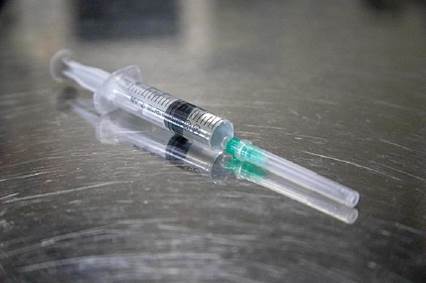
Copyright infringement is not intended
Context: The World Health Organization has stressed the need to accelerate trials for antimicrobial resistance-related vaccines in late-stage development and maximise the use of existing ones.
Details:
- Resistant-bacterial infections are associated with nearly 4.95 million deaths per year, with 1.27 million deaths directly attributed to AMR, WHO said.
- However, AMR is about more than bacterial infections. The resistance occurs when bacteria, viruses, fungi, and parasites change over time and no longer respond to medicines.
- When an individual becomes infected with these microbes, the infection is said to be resistant to antimicrobial medicines. These infections are often difficult to treat.
- Vaccines are powerful tools to prevent infections in the first place and therefore have the potential to curb the spread of AMR infections.
- The AMR vaccine pipeline report aims to guide investments and research into feasible vaccines to mitigate AMR, WHO said.
- Yet, of the top six bacterial pathogens responsible for deaths due to AMR, only one — Pneumococcal disease (Streptococcus pneumoniae) — has a vaccine
- While the report describes these late-stage vaccine candidates as having high-development feasibility, the report cautions that most will not be available anytime soon.
- The report calls for equitable and global access to the already existing vaccines, especially among populations that need them most in limited-resource settings.
- There are already vaccines available against four priority bacterial pathogens: Pneumococcal disease (Streptococcus pneumoniae), Hib (Haemophilus influenzae type b) Tuberculosis (mycobacterium tuberculosis) and Typhoid fever (Salmonella Typhi).
- Current Bacillus Calmette-Guérin (BCG) vaccines against tuberculosis (TB) do not adequately protect against TB and the development of more effective vaccines against TB should be accelerated, the report said.
- The remaining three vaccines are effective, and we need to increase the number of people receiving them to contribute to a reduction in the use of antibiotics and prevent further deaths.
- The lessons from COVID-19 vaccine development and mRNA vaccines offer unique opportunities to explore for developing vaccines against bacteria
- Of significance in the global fight against AMR, the bacteria noted in the priority pathogens list pose a significant threat to public health precisely because of their resistance to antibiotics — but they currently have a very weak vaccine pipeline in terms of the number of candidates and feasibility.
- Vaccines against these pathogens are unlikely to be available in the short term, and alternative interventions should be pursued urgently to prevent resistant infections due to priority bacterial pathogens.
- Vaccine development is expensive and scientifically challenging, often with high failure rates.
- For successful candidates, complex regulatory and manufacturing requirements require further time.
What are antimicrobials?
- Antimicrobials – including antibiotics, antivirals, antifungals and antiparasitics – are medicines used to prevent and treat infections in humans, animals and plants.
What is antimicrobial resistance?
- AMR happens when microorganisms (such as bacteria, fungi, viruses, and parasites) change and are still able to grow, even when they are exposed to antimicrobial medicines that are meant to kill or limit their growth (such as antibiotics, antifungals, antivirals, antimalarials, and anthelmintics).
- As a result, the medicines become ineffective and infections persist in the body, increasing the risk of spread to others.
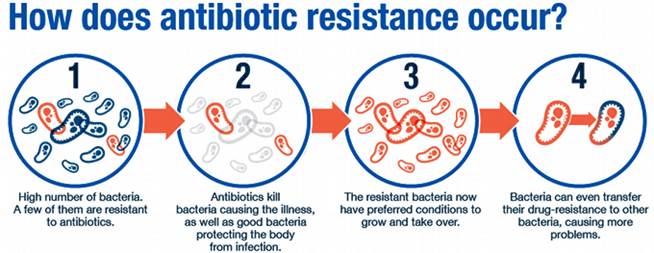
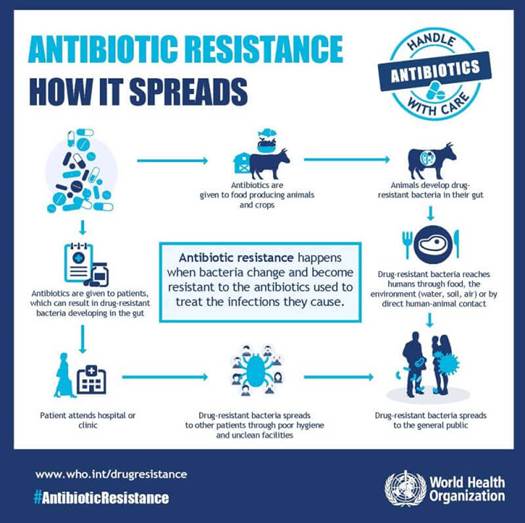
Impact of AMR

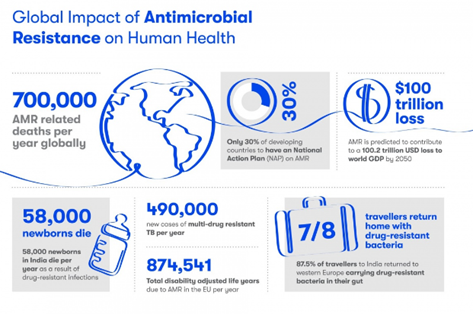
Statistics
- India is one of the largest consumers of antibiotics in the world.
- Antibiotic use in India has risen sharply, with about a 30% increase in their per capita use during the past decade, according to the State of the World’s Antibiotics 2021 report.
- 5 lakh people die annually due to AMR worldwide.
Findings of the recent Global Research on Antimicrobial Resistance (GRAM) Report
- 10-fold: Variation between countries in total antibiotic consumption rates, ranging from as low as 5 DDD to 45.9 DDD per 1000 population per day.
- 46% up: Between 2000 and 2018, global antibiotic consumption rates increased from 9.8 to 14.3 DDD per 1000 population per day).
- 76%: Increase observed between 2000 and 2018 in low- and middle-income countries (from 7.4 to 13.1 DDD per 1000 per day). In high-income countries, consumption rates remained stable.
- 116%: Increase in antibiotic consumption rates in South Asia. The second largest increase was in the North Africa and Middle East region (111%).
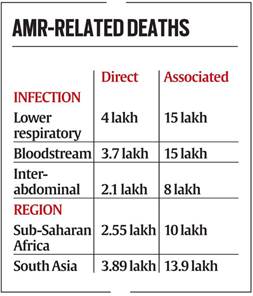
Factors leading to AMR
- The main drivers of antimicrobial resistance include the
- Misuse and overuse of antimicrobials;
- Lack of access to clean water,
- Sanitation and hygiene (wash) for both humans and animals;
- Poor infection and disease prevention and control in health-care facilities and farms;
- Poor access to quality, Affordable medicines, Vaccines and diagnostics;
- Lack of awareness and knowledge; and Lack of enforcement of legislation.
- Lack of access to timely and appropriate treatments for infections,
- Self-medication, prescription sharing, over-the counter sale of antimicrobials,
- Non-compliance with the prescribed treatment.
- Genetic mutation of bacteria.
- By one species acquiring resistance from another.
- Antimicrobial Waste
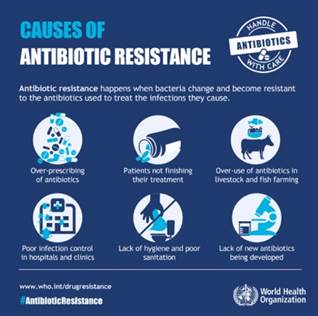
Steps taken to curb AMR in India
Red Line Campaign
- It urges people not to use medicines marked with a red vertical line, including antibiotics, without a doctor’s prescription. These medicines are called as the ‘Medicines with the Red Line’.
National Action Plan on Antimicrobial Resistance
- India has a National Action Plan on Antimicrobial Resistance in place
Delhi Declaration on Antimicrobial Resistance
- Delhi Declaration on Antimicrobial Resistance, was endorsed at the Inter-Ministerial Consultation on Antimicrobial Resistance in 2017.
AMR Surveillance Network
- ICMR has established AMR surveillance and research network (AMRSN) in 2013, to generate evidence and capture trends and patterns of drug resistant infections in the country.
- This network comprises of 30 tertiary care hospitals, both private and government.
AMR Research & International Collaboration
- ICMR has taken initiatives to develop new drugs /medicines through international collaborations in order to strengthen medical research in AMR.
- ICMR along with Research Council of Norway (RCN) initiated a joint call for research in antimicrobial resistance in 2017.
- ICMR along with Federal Ministry of Education and Research (BMBF), Germany has a joint Indo-German collaboration for research on AMR.
Initiatives to control overuse or misuse of antibiotics
- ICMR has initiated antibiotic stewardship program (AMSP) on a pilot project basis in 20 tertiary care hospitals across India to control misuse and overuse of antibiotics in hospital wards and ICUs.
- On the recommendations of ICMR, DCGI has banned 40 fixed dose combinations (FDCs) which were found inappropriate.
- ICMR worked in collaboration with Indian Council of Agriculture Research, Department of Animal Husbandry, Dairy and Fisheries and the DCGI to ban use of Colistin as growth promoter in animal feed in poultry.
Guidelines issued
- National Guidelines for Infection Prevention and Control in Healthcare Facilitie shave been released by MoHFW in Jan 2020.
- ICMR has developed evidence based treatment guidelines for treatment of ten syndromes of infections. It aims to rationalize the usage of antibiotics on Essential Medicines Formulary (EMF) and to establish consistency in the treatment of various infectious conditions.
- Further, ICMR has also issued the Treatment Guidelines for Antimicrobial Use in Common Syndromes” in 2019.
https://www.downtoearth.org.in/news/health/who-s-urgent-call-world-needs-new-antimicrobial-resistance-vaccines-83681



1.png)
